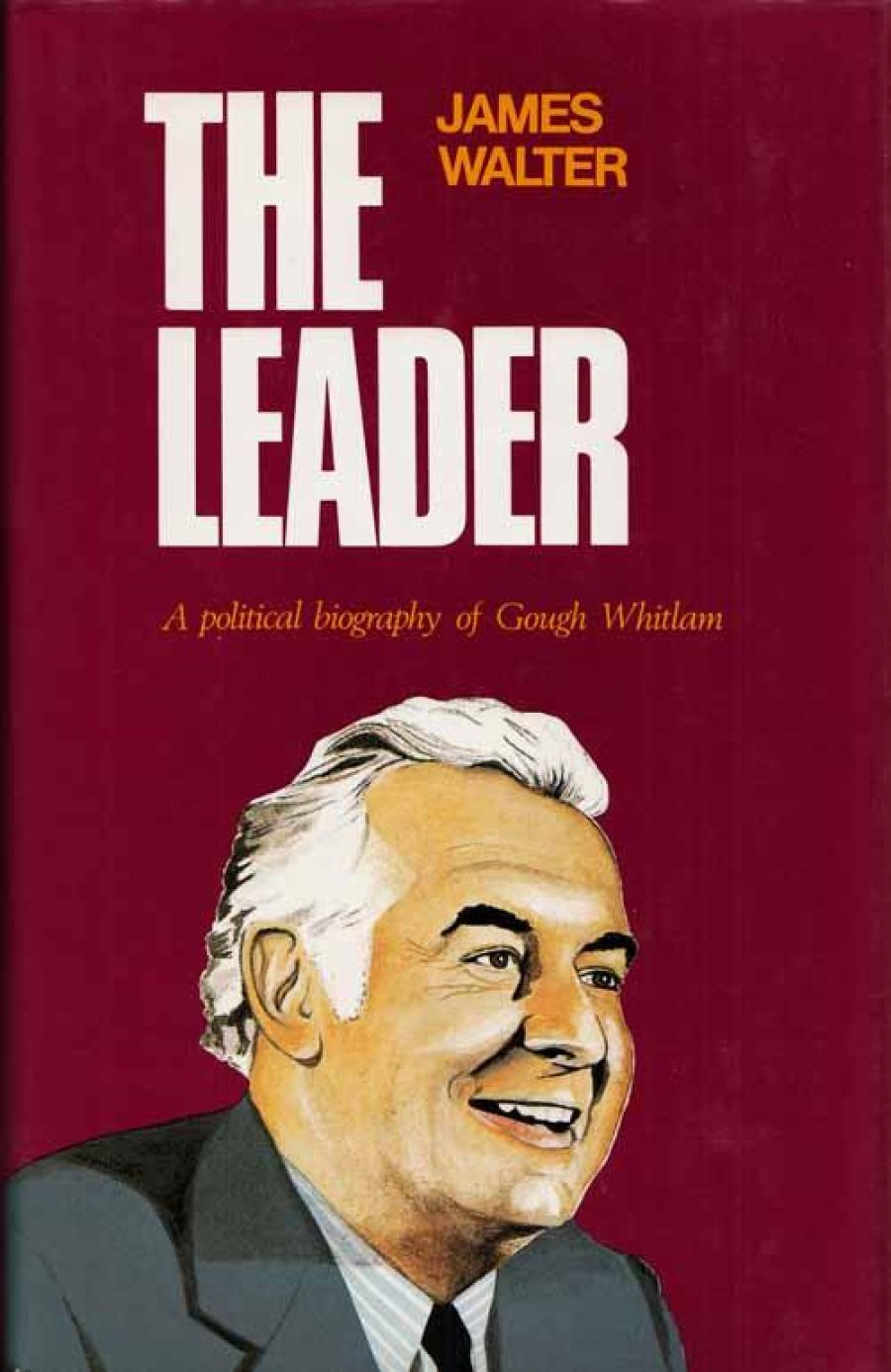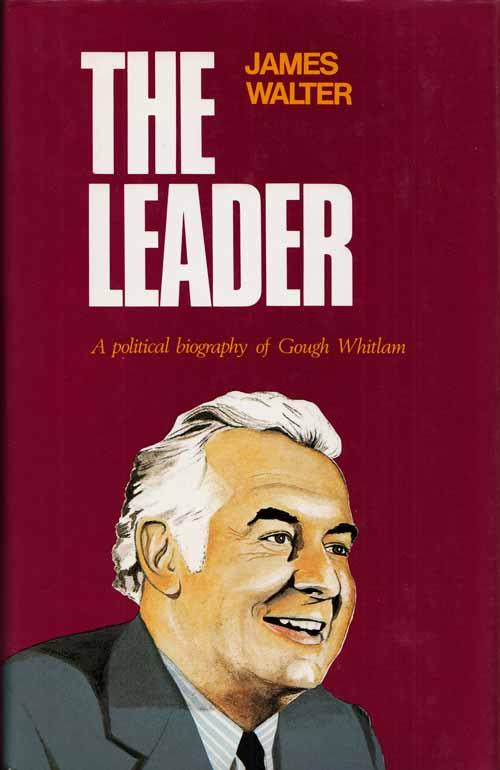
- Free Article: No
- Contents Category: Politics
- Review Article: Yes
- Article Title: A Certain Narcissism
- Online Only: No
- Custom Highlight Text:
It is ironic and, perhaps, happy for him that the most vainglorious of Australian Labor Party leaders has so quickly become the subject of more books than any Australian Prime Minister. Your ‘1975’ library now contains many instant histories, polemics, laments, critical academic studies, eulogies, and edited highlights, but not yet a comprehensive biography of Gough Whitlam.
- Book 1 Title: The Leader
- Book 1 Subtitle: A political biography of Gough Whitlam
- Book 1 Biblio: U.Q.P, $14.95 pb, 295 pp
- Book 1 Cover Small (400 x 600):

- Book 1 Cover (800 x 1200):

Eulogists such as Oakes (Whitlam PM) and Freudenberg (A Certain Grandeur) clearly received the assistance of Whitlam or his family. James Walter's The Leader has received no such patronage. By assiduous research amongst public documents, by interviews with Whitlam’s staff and political colleagues, and by his own interpretive insights and theoretical technique, Walter has produced an account of Whitlam’s personality and mind which is more penetrating, more intimate, than those of the privileged journalists, and more enlightening than the work of dissecting monographers.
In a celebrated anecdote, Whitlam referred to himself, when Prime Minister, as ‘the one thing going for' his government and party. Although essentially a study of Whitlam’s preparation for and performance of the role of leader (both of the Opposition and as Prime Minister), Walter’s book strongly implies that Whitlam was the destroyer of his own Government. The author bravely avoids two pervasive images: Whitlam as chivalric hero, as a martyr to social democracy: and the contrary, Whitlam as demon, as scapegoat for the conservative sense of Australia’s malaise in the late 1970s.
Walter's personal sentiments are complex and at times difficult to discern. An early generational and middle-class enthusiasm for Whitlam appears to have been replaced by profound irritation and a sense of incredulity at Whitlam’s decline. Walter’s disillusion is expressed in a critique of the Labor Government which focuses upon Whitlam as an inept manager – of people, of practical policy implementation, and of opinion – rather than upon Caucus or the Cabinet.
Whether one approved or disapproved, Whitlam as Prime Minister possessed a quality of psychological and political transparency which was not typical of Australian leadership. Walter unfortunately hints in some passages that the more conventionally successful and ‘adaptive’ the political leader, the less psychologically and dramatically interesting he would be to him. He seeks to avoid this implication, through a defence of Whitlam’s creative effects upon Australian culture, but his general view of leadership is lost in the clinical penumbra of the post-Freudian tradition in which he writes. A more comparative ‘biography’ of Malcolm Fraser as Prime Minister would be an interesting sequel to this book. It would unquestionably shed new light upon Whitlam’s usurper, whose mind is far less pellucid, and it would also illuminate James Walter’s values as a political, intellectual and cultural critic.
Walter appears to have supported Whitlam’s social democratic programme. In this light, his book is an unusual, and intellectually courageous, blend of (the more frequently right-wing) hostility to Whitlam’s personality, and psycho-analytic empathy. A great deal of latitude exists for assessments of which element predominates in Walter’s text. It is quite clear, however, that Walter sees Labor’s failure in government as ultimately attributable to its leader’s personal inadequacies, rather than the inertia (or mendacity) of bureaucratic, communications media, political, or economic structures. The Leader is therefore an original contribution to revisionist Whitlamism, contrasting with the prevailing revisionist argument that external sociological or political- economic factors were decisive.
A summary of Walter’s brilliant, highly compressed, and elegantly written account of Whitlam in action is difficult in the space allowed here. It also risks over-simplification, because Walter’s technique filters many conventional observations and criticisms of Whitlam through a series of difficult, unorthodox psychological concepts.
Walter applies to Whitlam an adaptation of the concept of ‘narcissism’ developed by the Chicago psycho-analyst Heinz Kohut. This enables him to synthesise many salient traits: Whitlam’s characteristic style of brinkmanship, confrontation, and the personalisation of issues, best summarised in his own phrase ‘crash through or crash’; his obsession with speedy executive decision, with ‘the programme’ as a whole; his instructional and, Walter argues, essentially inspirational style of leadership; and his marshalling of vast masses of information (and experts) as both an argument for reform and as a personal resource to (hopefully) guarantee tactical supremacy in the party. Cabinet, and Parliament.
Walter rightly criticises Whitlam as ‘a managerial naif’, incapable of coordinating the implementation of his programme, a man possessed of ‘a total vision but not a total design’. Whitlam confused ‘knowing about with knowing how’. Personal incapacity to understand or adjust his actions to the responses of significant others, such as Ministers, Caucus, public servants, media proprietors, or ‘the electorate’ actually intensified Whitlam’s natural isolation and the inevitability of his decline. His style of thought, speech and action, Walter argues, forced his opponents to ‘play for all or nothing’. Thus, Whitlam directly contributed to the psychological climate which led to his ruthless and unorthodox mode of overthrow, while he constitutionally lacked the power to realise what was happening.
Presented with great clarity and sophistication, Walter’s argument will become indispensable to future debate and analysis of the events of 1972-1975. Less convincing, however, is Walter’s attempt to work backwards through Whitlam’s life, towards a rounded, humanistic biography.
Walter’s technique of working from the adult to the child, from the outer to the inner man, is commendably unorthodox Freudianism or psychobiography, but it is methodologically unsatisfactory. There is no objection, in principle, to his placement of Whitlam’s childhood at the end of the book rather than the beginning. Walter genuinely seeks to avoid the common Freudian trap of reductionism and determinism. By doing so, however, he faces the inherent biographical problem of predetermination in reverse. He imposes an adult pattern, the ‘narcissistic’ personality type, upon Whitlam’s earlier life.
Because Walter’s real interest (and talent) lies in analysis of ‘the stage rather than the dressing-room’ (his phrase), this book is an inadequate substitute for conventional narrative or linear biography. Although he gathered new (but unattributed) information about, for example, Whitlam’s mother, Walter relies too uncritically upon extant accounts of the pre-political life, written by Oakes, Freudenberg and others. Whitlam’s years in the R.A.A.F. and at the Bar are perfunctorily discussed. Walter’s lines on Whitlam’s marriage are gratuitous. His explanation of why and how Whitlam became an A.L.P. branch member – his indignation at the defeat of Evatt’s 1944 ‘Powers Referendum’ – is crude and lacks historical context.
This last point is not unimportant, for Walter wishes to show that politics was the only feasible solution to Whitlam’s inner developmental struggle between the narcissism grounded in his oedipal period and the idealism learned from his patrician public servant father. If true, how could Whitlam fail so disastrously in politics, and retain what some psychiatrists coyly describe as the ‘integrity of (his) personality’? How could Whitlam successfully switch vocations, from politics to academic life? Walter’s answers to these questions are distinctly equivocal.
That they remain unanswerable is no reflection upon life or social reality. Such biographical indeterminacy is of the essence of humanity, which in Whitlam’s case is still a lively, if severely displaced and perhaps disoriented, presence among us.
The openness of these questions does reflect, however, upon Walter’s attempt to apply ‘scientific’ techniques to contemporary biography. Psycho-analytic constructs do not have the ‘predictive’ power which Walter attributes to them, and do not constitute a final solution to the instinctive, ad hoc judgements which confront all biographers, conventional or otherwise. Through his own powerful insight into Whitlam at the height of his powers, Walter has made an indelible contribution to the understanding of his paradoxes. This is a contribution not to ‘political science’ but to the best kind of


Comments powered by CComment